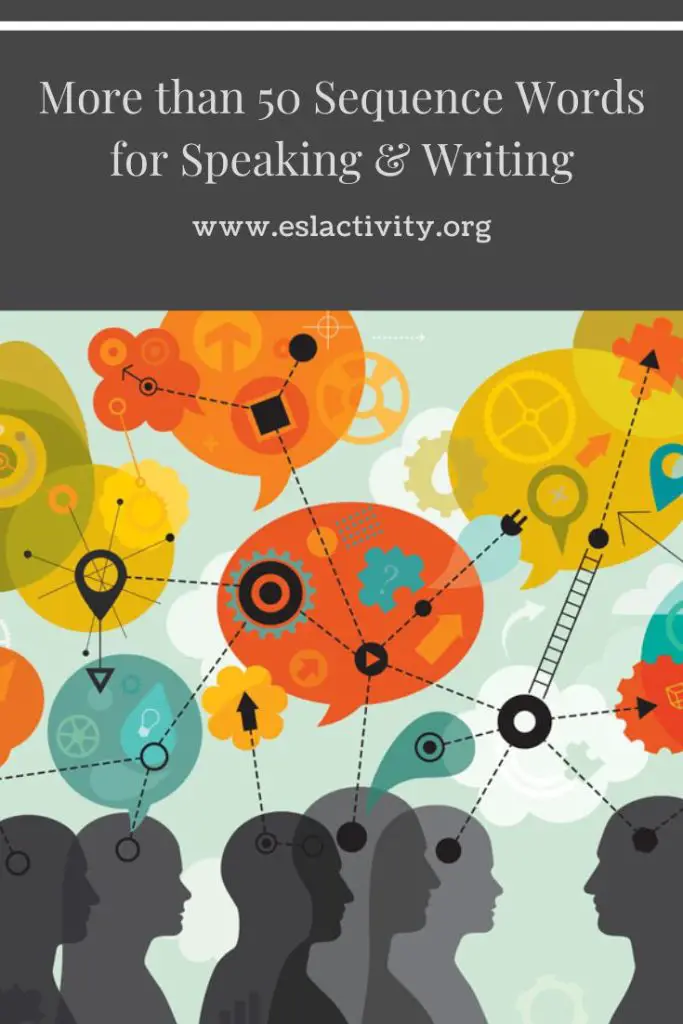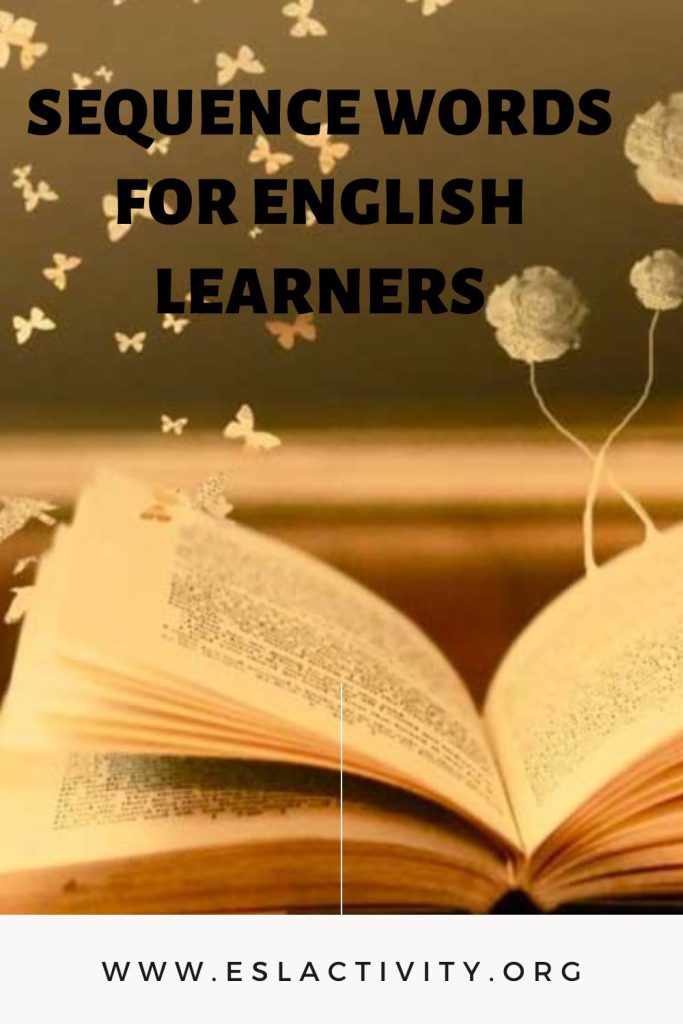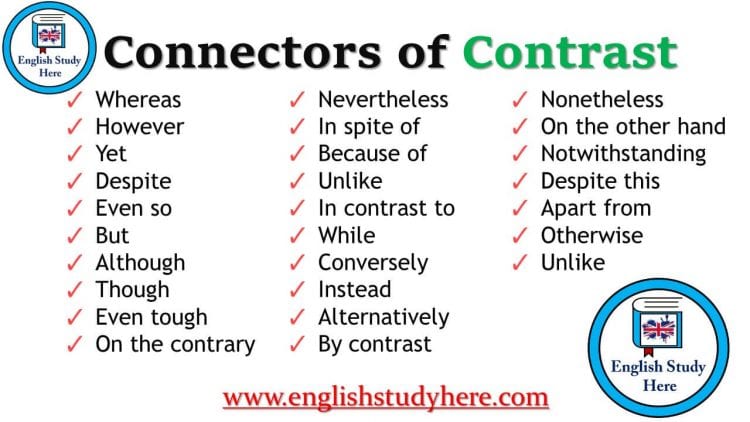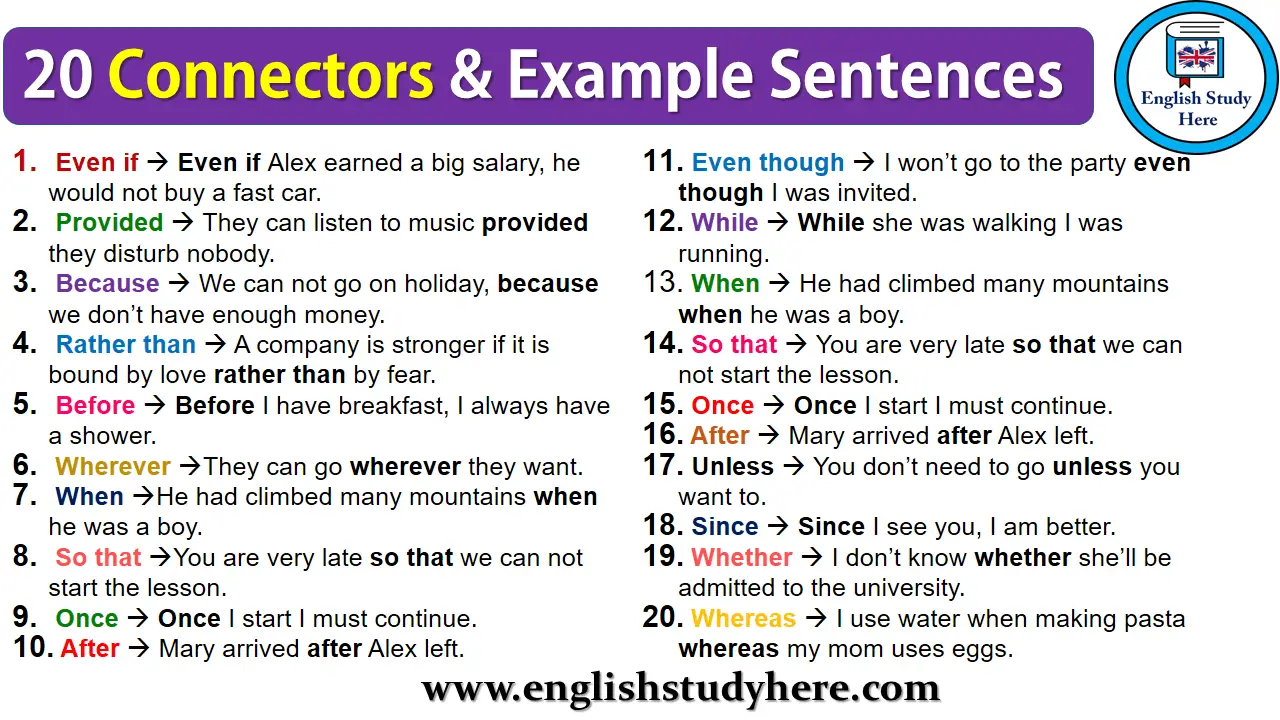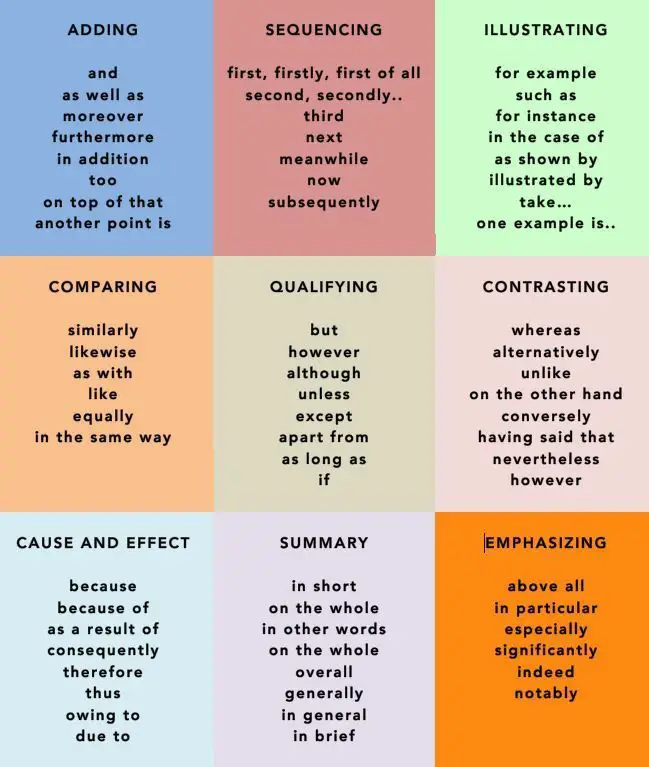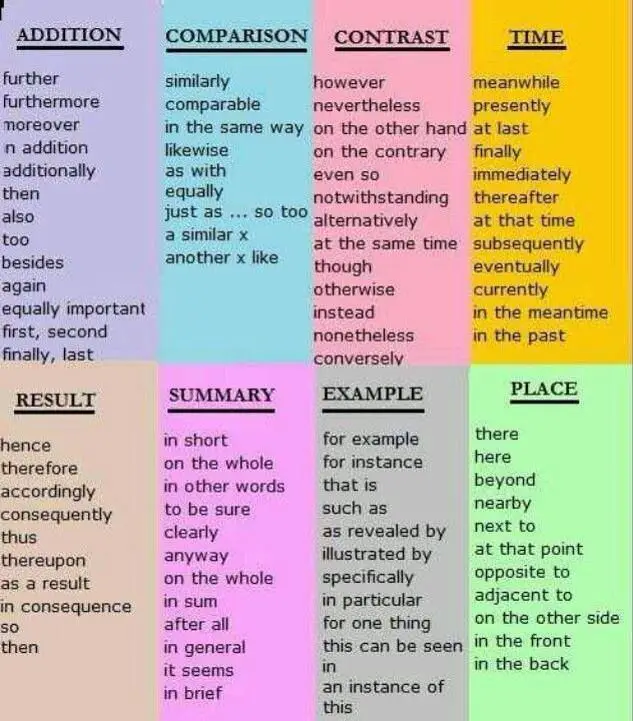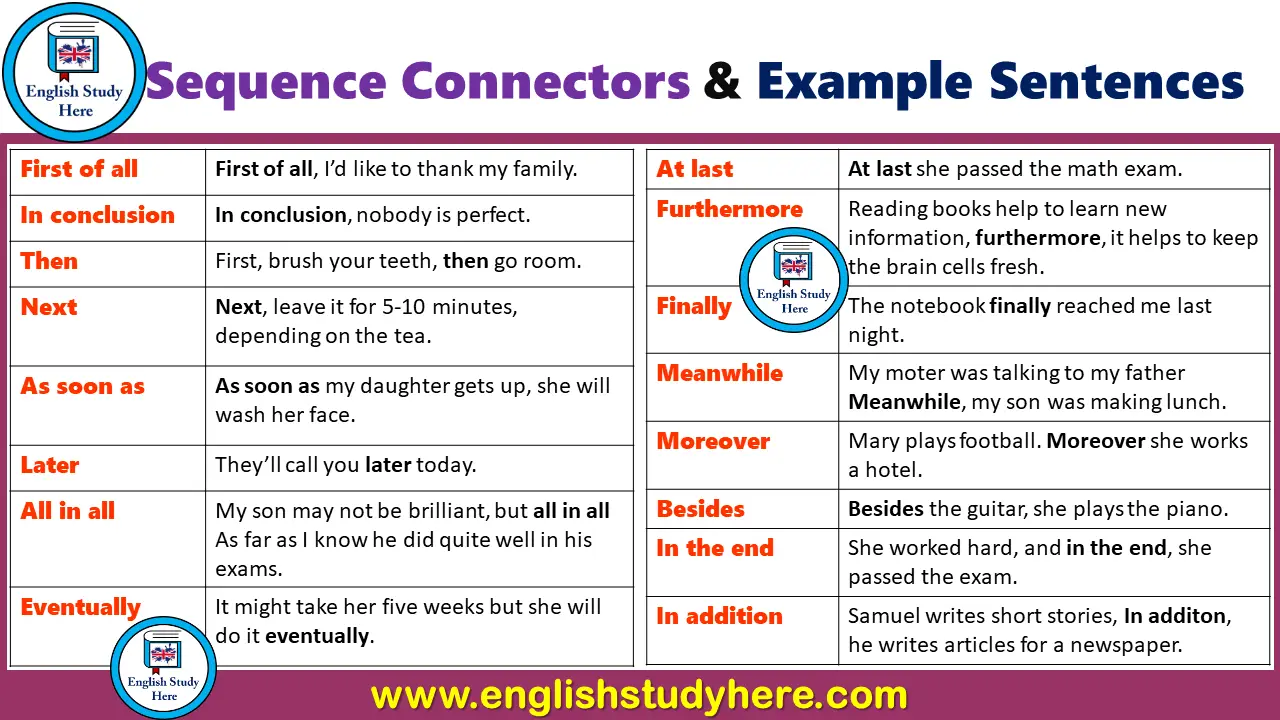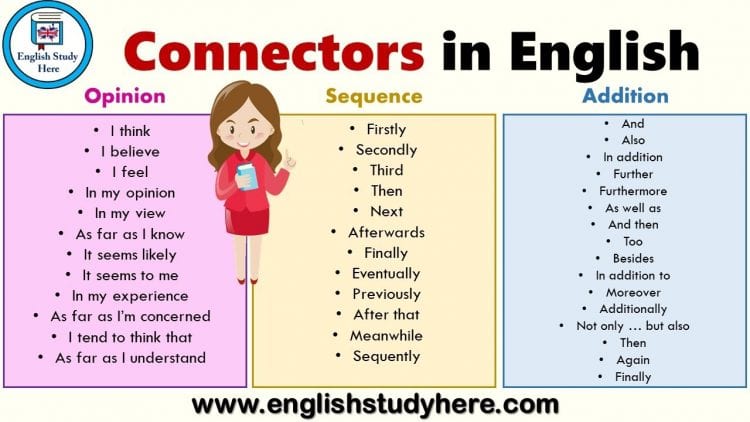
Learn daily new words to improve your English because nowadays the English section is becoming more complicated, so you need to pay special attention to this section. And English will never improve without a strong vocabulary.
That’s why we are here to help you to improve your vocabulary. You can learn important daily vocabulary from the vocabulary list with proper explanation.
Important vocabulary word list with example sentence Day-39
1) Expedition- (noun)
Hindi Meaning- अभियान, मुहिम, चढ़ाई, खोज-यात्रा
English Meaning- A trip taken by a group of people for a special purpose.
Synonyms- outing, journey, voyage, campaign, jaunt, junket, alacrity, drive, mission,
Antonyms- halt, hindrance, drawback, inaction, avocation,
Example Sentence- The clean India expedition will succeed if almost everyone will participate in it.
2) Absurd- (adjective)
Hindi Meaning- बेतुका, हास्यास्पद, असंगत, बेहूदा
English Meaning- Something which is illogical or inappropriate.
Synonyms- senseless, foolish, ludicrous, silly, irrational, illogical, laughable, wild, ridiculous
Antonyms- logical, intelligent, valid, sensible, substantial, rational, brainy, solemn
Example Sentence- His lifestyle is so absurd that people hesitate to talk with him.
3) Erupt- (verb)
Hindi Meaning- विस्फोट होना, निकल आना, फटना
English Meaning- Something which breaks out suddenly.
Synonyms- burst, explode, detonate, break, discharge, spurt, spurt, break out, emit, spout
Antonyms- carry, contain, catnap, bring, consume, adapt, acquire,
Example Sentence- The peace march erupted into a violent carnage.
4) Coercion- (noun)
Hindi Meaning- बलप्रयोग, जोर जबरदस्ती, बलात्कार
English Meaning- Using pressure or threat to get someone to do something.
Synonyms- brutality, violence, ferocity, fury, extortion, pressure, commotion, drive
Antonyms- autonomy, liberty, democracy, independence, favor, back, permission
Example Sentence- The police used coercion to make the criminal, to tell the truth.
5) Sedentary- (adjective)
Hindi Meaning- गतिहीन, सुस्त, बैठा हुआ, अभ्रमणशील
English Meaning- Staying in one place without activity.
Synonyms- motionless, immobile, stationary, idle, sluggish, inactive, unmoving, static
Antonyms- athletic, active, energetic, moving, activated, vivacious, vigorous
Example Sentence- Gadgets and Televisions are making the people sedentary day by day.
6) Instance- (noun)
Hindi Meaning- उदाहरण, घटना, प्रेरणा, आग्रह
English Meaning- A particular incident, and an example.
Synonyms- specify, example, illustration, sample, paradigm, pattern, standard, incident
Antonyms- repetition, device, indication
Example Sentence- After the Kargil instance, there is a lack of trust in the India-Pakistan relation.
7) Indigent- (noun & adjective)
Hindi Meaning- दरिद्र, जरूरतमंद, गरीब,
English Meaning- A needy and poor person.
Synonyms- poor, needy, necessitous, underprivileged, bankrupt, moneyless, beggarly
Antonyms- abundant, generous, wealthy, rich, affluent, prosperous, advantaged
Example Sentence- We are in the 21st century, but still, there are a large number of people who are so indigent that they can’t afford three meals a day.
 Indignity- (noun)
Indignity- (noun)
Hindi Meaning- अपमान, अवहेलना, तिरस्कार, क्रोध
English Meaning- An act or situation that makes a person feel shame or embarrassment.
Synonyms- humiliation, abuse, outrage, insult, affront, discourtesy, offense, disrespect
Antonyms- honor, dignity, respect, glory, benevolence, compliment, glory, admire, dignify
Example Sentence- He committed suicide because he could not tolerate the indignity.
9) Assault- (noun & verb)
Hindi Meaning- आक्रमण, धावा, आक्रमण करना
English Meaning- A physical attack on someone or somewhere.
Synonyms- invasion, attack, strike, raid, onslaught, invade, onset, incursion, blitz, force
Antonyms- protect, support, assert, guard, defend, uphold, withstand, shelter, adhere
Example Sentence- There are millions of people who died in various assaults in the world.
10) Perpetrator- (noun)
Hindi Meaning- अपराधी, मुजरिम
English Meaning- A person who involved in illegal activity.
Synonyms- offender, culprit, crook, criminal, violator, malefactor, villain, wrongdoer
Antonyms- victim, sufferer, target, martyr, innocent, injured, scapegoat, tolerator
Example Sentence- The government assured the victim’s family that the perpetrator would be punished.
LEARN THE DAY-38 LIST
These are the 10 important vocabulary words from the Important vocabulary word list with example sentence Day-39. Our mission is to provide the most important vocabulary word list so that you can improve your English. Here you can learn the complete list of vocabulary.
Contents
- 1 Advanced Vocabulary Word List for IELTS learners to Score Band 7.5 or Higher
- 2 IELTS Band 8 Vocabulary word list with meaning and example sentences
- 2.1 A
- 2.2 B
- 2.3 C
- 2.4 D
- 2.5 E
- 2.6 F
- 2.7 G
- 2.8 H
- 2.9 I
- 2.10 J
- 2.11 K
- 2.12 L
- 2.13 M
- 2.14 N
- 2.15 O
- 2.16 P
- 2.17 Q
- 2.18 R
- 2.19 S
- 2.20 T
- 2.21 U
- 2.22 V
- 2.23 W
- 2.24 X
- 2.25 Z
- 3 Importance of an Advanced Vocabulary in IELTS
Advanced Vocabulary Word List for IELTS learners to Score Band 7.5 or Higher
IELTS vocabulary word list helps you to understand where to use the words in the sentence as well as the pronunciation of some difficult words that can be used in your IELTS examination for getting a good band score.
Whether it is Listening, Reading, Writing or Speaking, to crack the IELTS examination, knowing vocabulary is very important, you can get 25%-30% of your marks through vocabulary. To pass your IELTS test with a high score, you need a good grasp of academic vocabulary.
The Advanced Vocabulary List is a list of words that you can make use of in your IELTS Speaking & Writing to improve your IELTS score.
IELTS Band 8 Vocabulary word list with meaning and example sentences
As we know, the use of an advanced vocabulary during the IELTS examination helps you gain more points for your answers and thereby helps you obtain a higher band score. Therefore, it is important to increase your vocabulary with rare and unique words to improve your performance. Given below is a list of rare words that can be used during your IELTS Speaking and Writing tasks to increase your IELTS score.
A
- Aberration
- Abhorrence
- Accelerate
- Accumulate
- Accuracy
- Acquiesce
- Advent
- Adversity
- Advocate
- Alumnus
- Ambiguous
- Ambivalent
- Analogy
- Antique
- Appetite
- Appease
- Apprehensive
- Arbitrary
- Archaeology
- Ascribe
- Assimilate
- Assumption
- Astounding
- Attribute
- Avarice
B
- Banter
- Bedrock
- Biased
- Bizarre
- Brazen
C
- Calamity
- Callous
- Camouflage
- Candid
- Chronic
- Circumspect
- Clandestine
- Coerce
- Coherent
- Coincidence
- Commemorate
- Commence
- Compatible
- Compensate
- Complacent
- Condemn
- Consensus
- Consent
- Consequence
- Cosmopolitan
- Courageous
- Credit
- Crucial
- Cumbersome
- Cumulative
D
- Debase
- Debatable
- Decry
- Deduce
- Defence
- Deference
- Demeanour
- Demure
- Derive
- Diligent
- Diminish
- Discern
- Discrete
- Distinct
- Distraction
- Distribute
- Divulge
- Dominate
- Drown
E
- Elated
- Embrace
- Empathy
- Endurance
- Engender
- Equate
- Erudite
- Erratic
- Evoke
- Exclude
- Exorbitant
- Exemplary
F
- Fabricate
- Facade
- Fatality
- Fathom
- Feasible
- Feature
- Feral
- Ferment
- Fleeting
- Forsake
G
- Garnish
- Gluttony
- Gratuitous
- Gregarious
H
- Haughty
- Hideaway
- Hierarchy
- Hoard
I
- Identical
- Impeccable
- Impertinent
- Impudent
- Incompatible
- Inevitable
- Interpret
- Intractable
- Isolate
J
- Jubilant
K
- Knackered
L
- Launder
- Legislation
- Licence
- Lithe
- Ludicrous
M
- Malicious
- Manipulate
- Mechanism
- Metamorphosis
- Migrate
- Momentous
- Mundane
N
- Nadir
- Nascent
- Negate
- Noble
- Nominal
- Notorious
- Notwithstanding
- Novice
- Nuance
O
- Oblige
- Oblivious
- Obsolete
- Obtainable
- Obtuse
- Overcome
- Overdo
P
- Panacea
- Panic
- Paradigm
- Perceive
- Petrify
- Pique
- Plateau
- Platitude
- Plethora
- Postulate
- Prestige
- Principle
- Prohibit
- Proceed
- Proclivity
- Procure
- Procrastinate
- Prognostication
- Prohibitive
- Proliferation
- Protectorate
- Provisional
- Proximity
Q
- Qualitative
R
- Rash
- Reaffirm
- Reciprocal
- Refinement
- Refurbish
- Reinforce
- Reiterate
- Repudiate
- Resident
- Restrict
- Rotate
S
- Salient
- Scenario
- Sedentary
- Seek
- Sporadic
- Squander
- Stimulate
- Stringent
- Superfluous
- Suspension
T
- Tantamount
- Teeming
- Tremendous
- Trivial
U
- Ultimate
- Underestimate
- Undertake
V
- Valid
- Vanquish
- Vaunt
- Velleity
- Venerable
- Versatile
- Vicissitude
- Volatile
W
- Wingspan
- Woes
X
- Xenophobia
Z
- Zealous
- Zenith
Importance of an Advanced Vocabulary in IELTS
One of the most important aspects of an individual’s English language skills that are taken into account during the IELTS examination is their ability to use uncommon words with relative ease. An advanced vocabulary is mandatory if you wish to obtain a high band score in IELTS.
The various parameters on which an individual’s lexical knowledge is assessed include the variety of words used, the level of accuracy and the suitability with which these words are used to structure the answers and also the ability to bridge a gap in vocabulary by using different words or synonyms. The application of these features during the IELTS exam helps you to increase the quality, readability and level of sophistication of your answers. That being said, the more elegant your answers are, the higher your score will be in IELTS.
There are several ways to increase and improve your vocabulary to meet the standards demanded by IELTS. Investing a part of your daily routine in reading newspapers, journals and magazines from reputed publishers can significantly increase your vocabulary. Also, developing a reading habit for both fiction and non-fiction books is a genuine approach to nurture your verbal knowledge.
Conclusion
Improving your vocabulary, especially for the IELTS examination, can be a tedious task. However, it is important to understand that having a refined vocabulary can significantly improve your overall IELTS band score, as the use of uncommon words holds considerable weightage during the calculation of your score. Hopefully, the list of words provided in the article will prove beneficial in enhancing your vocabulary for IELTS.
Frequently Asked Questions
What is the importance of advanced vocabulary in the IELTS exam?
Each segment of the IELTS has a common criterion, Vocabulary (Lexical Resource), that contributes to 25% of the score in the speaking and writing modules, whereas it greatly aids the reading and listening sections of the IELTS exam. Thus, advanced vocabulary in the IELTS is a necessary soft skill that can significantly boost the IELTS band score
How does vocabulary aid in the IELTS modules?
Vocabulary in the IELTS Writing & Speaking test helps curate the test-taker’s ideas better. Having good vocabulary in IELTS Reading & Listening tests makes it easier to get the answers correct in the exam. Thus, a wider range of vocabulary helps to not only understand the question but also locate the answers through skimming and scanning, using synonyms and connecting the contexts better
Describe some strategies for improving a test-IELTS taker’s vocabulary
In order to enhance the IELTS vocabulary, the test-taker can do a lot of reading, research for new words, listen to English audio/ video every day, have the habit of keeping a dictionary, make their own mnemonics, use flashcards and read newspapers & magazines. They should not memorize the vocabulary and instead, understand the meaning and use it accordingly
Why is having a large vocabulary useful in the IELTS?
Having a broad level of vocabulary, without a doubt, is extremely beneficial for those attempting the IELTS exam. It is as important as understanding and utilizing it intelligently and efficiently in the IELTS because knowing a huge number of words and using them while speaking or writing without comprehending their meaning will lead to complications
How many words are enough for the IELTS exam?
An IELTS aspirant preparing for the IELTS exam must have a large vocabulary – approximately 6,000 to 7,000 word families to attempt the IELTS exam effectively and pass out with flying colours.
Englishbix will help you to learn about some of the non-reversible word pairs. These pair of words will appear in similar order and they go together that can be read in back and forth. These words can be used by English learners to improve their vocabulary.
Below are a few common examples of English word pairs that go together from a to z.
| Adam and Eve | life or death |
| back and forth | lock and key |
| bacon and eggs | lost and found |
| bed and breakfast | man and wife |
| birds and bees | name and address |
| black and white | nice and easy |
| body and soul | null and void |
| bread and butter | peaches and cream |
| bread and water | pen and pencil |
| bricks and mortar | pork and beans |
| bride and groom | pots and pans |
| business and pleasure | prim and proper |
| by and large | profit and/or loss |
| cause and effect | pros and cons |
| cloak and dagger | pure and simple |
| coat and tie | rain or shine |
| coffee and doughnuts | ranting and raving |
| cream and sugar | read and write |
| crime and punishment | right and/or wrong |
| cup and saucer | rise and fall |
| dead or alive | salt and pepper |
| down and out | shirt and tie |
| first and last | shoes and socks |
| fish and chips | short and fat |
| flesh and blood | signed and sealed |
| forgive and forget | slip and slide |
| front and center | soap and water |
| fun and games | sooner or later |
| give and take | stars and stripes |
| ham and eggs | suit and tie |
| hammer and nail | supply and demand |
| hemmed and hawed | sweet and sour |
| high and dry | tall and thin |
| high and low | thick and thin |
| hot and bothered | tossed and turned |
| huffing and puffing | touch and go |
| husband and wife | trial and error |
| in and out | trials and tribulations |
| Jack and Jill | up and/or down |
| knife and fork | wait and see |
| ladies and gentlemen | war and peace |
| law and order | wine and cheese |
Keep exploring Englishbix to learn about minimal pairs used in speech therapy and correlative conjunction pairs.
Quick Links
- Examples of Correlative Conjunctions Pairs
- Final Consonant Deletion Word Pairs
Synonym! Following is a list of synonyms in English with the picture and example sentences. Learn those words to help you expand your vocabulary words.
List of Synonyms
- Always ~ Forever
- Aid ~ Help, Assist
- Aggressive ~ Militant
- After ~ Following, Next
- Afraid ~ Scared
- Advocate ~ Support
- Zenith ~ Apex
- Yield ~ Produce
- Neutral ~ Impartial
- Nervous ~ Perturbed
- Negligent ~ Inattentive
- Neat ~ Tidy
- Naughty ~ Disobedient
- Mysterious ~ Occult
- Wrong ~ Mistaken
- Worn ~ Old
- Wonderful ~ Marvellous
- Wise ~ Knowing
- Win ~ Succeed
- Hate ~ Loathe
- Hard ~ Firm
- Enemy ~ Opponent
- Encourage ~Support
- Immune ~ Exempt
- Immature ~ Inexperienced
- Immaculate ~ Spotless
- Ignorant ~ Unaware
- Idle ~ Lazy
- Identical ~ Duplicate
- Vague ~ Indistinct
- Vacant ~ Empty
- Urgent ~ Important
- Upset ~ Perturb
- Unbiased ~ Impartial
- Turmoil ~ Disturbance
- Turbulent ~ Blustering
- Trivial ~ Worthless
- Total ~ Entire,
- Thrive ~ Prosper
- Surplus ~ Excess
- Suppress ~ Restrain
- Superb ~ Magnificent
- Sufficient ~ Ample
- Successful ~ Prosperous
- Dead ~ Lifeless
- Dawn ~ Daybreak
- Dark ~ Dismal
- Daring ~ Bold
- Dangerous ~ Unsafe
- Damage ~ Hurt
- Stupid ~ Dense
- Stationary ~ Fixed
- Stable ~ Steady
- Spontaneous ~Automatic
- Special ~ Exceptional
- Nice ~ Pleasing
- New ~ Fresh
- Mourn ~ Grieve
- Morose ~ Sullen
- Morbid ~ Awful
- Moral ~ Ethical
- Monotonous ~ Boring
- Momentous ~ Powerful
- Moderate ~ Lenient
- Mobile ~ Moveable
- Misfortune ~ Mishap
- Mischievous ~Impish
- Mirth ~ Fun
- Minor ~ Lesser
- Militant ~ Combative
- Migrant ~ Drifting
- Mend ~ Repair
- Mediocre ~ Fair
- Mean ~ Unkind
- Maximum ~Uppermost
- Mandatory ~ Required
- Magnify ~ Expand
- Intriguing ~ Fascinating
- Intolerant ~ Bigoted
- Internal ~ Inner
- Intermittent ~ Sporadic
- Infuriate ~ Enrage
- Inferior ~ Substandard
- Independent ~ Autonomous
- Important ~Meaningful
- Impetuous ~ Reckless
- Imperfect ~ Faulty
- Imperative ~ Crucial
- Impatient ~ Eager
- Impartial ~ Neutral
- Humiliate ~ Embarrass
- Humble ~ Modest
- Huge ~ Vast
- Hostile ~ Antagonistic
- Hospitable ~ Cordial
- Honest ~ Truthful
- Hold ~ Grasp
- High ~ Elevated
- Help ~ Aid
- Empty ~ Drain
- Ecstasy ~ Joy
- Eccentric ~ Unusual
- Easy ~ Simple
- Early ~ Premature
- Dumb ~ Stupid
- Dull ~ Blunt
- Dubious ~ Doubtful
- Dry ~ Arid
- Dreadful ~ Terrible
- Drastic ~ Extreme
- Drab ~ Dull
- Doubt ~ Mistrust
- Dormant ~ Inactive
- Antagonize ~ Provoke
- Ambitious ~ Aspiring
- Amateur ~ Beginner
- Docile ~ Tame
- Divide ~ Split
- Diverse ~ Distinct
- Dispute ~ Debate
- Disagree ~ Differ
- Dirty ~ Soiled
- Diminish ~ Curtail
- Dilute ~ Weaken, Thin
- Difficult ~ Hard
- Different ~ Unlike
- Die ~ Expire
- Determined ~Convinced
- Deter ~Prevent
- Detach ~Unfasten
- Dally ~ Loiter
- Cry ~ Sob
- Cruel ~ Mean
- Crazy ~ Insane
- Cranky ~ Cross
- Cosy ~ Comfortable
- Convenient ~ Handy
- Convalesce ~ Recover
- Continue ~ Persist
- Contented ~ Satisfied
- Contaminate ~ Defile
- Vicious ~ Ferocious
- Vibrate ~ Tremble
- Valiant ~ Courageous
- Constantly ~ Always
- Considerate ~ Thoughtful
- Abbreviate ~ Condense
- Abandon ~ Forsake
- Conservative ~ Cautious
- Consecutive ~ Successive
- Conscious ~ Aware
- Conscientious ~ Virtuous
- Connect ~ Join
- Congested ~ Stuffed
- Confuse ~ Complicate
- Conform ~ Comply
- Conflict ~ Oppose
- Conflict ~ Fight
- Confine ~ Contain
- Before ~ Prior
- Beautiful ~ Attractive
- Bashful ~ Shy
- Barren ~ Infertile
- Ban ~ Forbid
- Awkward ~ Clumsy
- Awful ~ Atrocious
- Arrogant ~ Haughty
- Arrive ~ Reach, Come
- Approve ~ Endorse
- Apparent ~ Evident
- Adult ~ Grown-Up
- Adjourn ~ Postpone
- Achieve ~ Accomplish
- Accurate ~ Correct
- Abundant ~ Ample
- Above ~ Overhead
- Able ~ Capable
- Ability ~ Skill
Synonyms List with Examples
Always ~ Forever
- The husband is always the last to know.
- Time goes with the wind, I love you forever.
Aid ~ Help, Assist
- We will aid their struggle against violent repression.
- Several people were passing but nobody offered to help.
Aggressive ~ Militant
- Some children are much more aggressive than others.
- The fiery right-wing leader toned down his militant statements after the meeting.
After ~ Following, Next
- Dogs that run after many hares kill none.
- The following is a summary of our conclusions.
Afraid ~ Scared
- Courage is being afraid but going on anyhow.
- They had their opponent running scared.
Advocate ~ Support
- The group does not advocate the use of violence.
- She prostituted herself in order to support her children.
Zenith ~ Apex
- In the 1860s, Tolstoy was at the zenith of his achievement.
- At 37, she’d reached the apex of her career.
Yield ~ Produce
- That apple tree yields plenty of apples.
- Earthquakes produce two types of seismic waves.
Neutral ~ Impartial
- I always tried to remain neutral when they started arguing.
- Far from being impartial, he had an obvious target.
Nervous ~ Perturbed
- I felt really nervous before the interview.
- We were perturbed to hear of his disappearance.
Negligent ~ Inattentive
- She was negligent in her work.
- Roger was hyperactive and inattentive as a child.
Neat ~ Tidy
- She always kept her room neat.
- She left a tidy fortune when she died.
Naughty ~ Disobedient
- Those naughty boys have been acting up again.
- She jumps on her children instantly if they’re disobedient.
Mysterious ~ Occult
- The distant mountains looked hazy and mysterious.
- Dahmer’s family feared he was involved in the occult.
Wrong ~ Mistaken
- Naturally, I get upset when things go wrong.
- It was a simple case of mistaken identity.
Worn ~ Old
- Your blanket is worn out.
- An old dog will learn no new tricks.
Wonderful ~ Marvellous
- Flying a plane is wonderful, you have no idea.
- He’s done a marvellous job of the decorating.
Wise ~ Knowing
- Honest men marry soon, wise men not at all.
- Ron gave her a knowing smile.
Win ~ Succeed
- We appealed to reason to win our argument.
- Sadness and gladness succeed each other.
Hate ~ Loathe
- She professed to hate her nickname.
- I loathe negativity. I can’t stand people who moan.
Hard ~ Firm
- Poverty and love are hard to hide.
- A relatively firm material can be anticipated.
Enemy ~ Opponent
- He who overcomes his anger subdues his greatest enemy.
- He socked his opponent on the jaw.
Encourage ~Support
- Remove dead leaves to encourage new growth.
- She prostituted herself in order to support her children.
Immune ~ Exempt
- I’m immune to smallpox as a result of vaccination.
- The interest on the money is exempt from tax.
Immature ~ Inexperienced
- He implied that we were emotionally immature.
- Given that they’re inexperienced, they’ve done a good job.
Immaculate ~ Spotless
- He gave an immaculate performance as the aging hero.
- The house was bright and absolutely spotless .
Ignorant ~ Unaware
- To be conscious that you are ignorant is a great step to knowledge.
- Many people are unaware of just how much food and drink they consume.
Idle ~ Lazy
- An idle brain is the devil’s workshop.
- He felt too lazy to get out of bed.
Identical ~ Duplicate
- The handwriting on both cheques is identical.
- Is this a duplicate or the original?
Vague ~ Indistinct
- His vague ideas crystallized into a definite plan.
- I have only an indistinct memory of my grandfather.
Vacant ~ Empty
- Are there any vacant rooms in this hotel?
- An empty hand is no lure for a hawk.
Urgent ~ Important
- I must post this letter; it’s urgent.
- War is much too important to be left to the military.
Upset ~ Perturb
- He was too upset to be rational.
- My unexpected arrival didn’t perturb him in the least.
Unbiased ~ Impartial
- Every effort is made to obtain an unbiased opinion.
- Reporters must be impartial and not show political bias.
Turmoil ~ Disturbance
- We need to see powerful men in turmoil.
- Troops were brought in to put down the disturbance.
Turbulent ~ Blustering
- This has been a turbulent week for the government.
- He was still blustering, but there was panic in his eyes.
Trivial ~ Worthless
- He often dissipated his energies in trivial matters.
- He dismissed the opinion polls as worthless.
Total ~ Entire
- Nobody can envisage the consequences of total nuclear war.
- The entire family was demeaned by his behaviour.
Thrive ~ Prosper
- A business cannot thrive without investment.
- The children seemed to prosper under their grandparent’s care.
Surplus ~ Excess
- It’s an essay heavy with surplus phrasing.
- Trim off the excess pastry using a sharp knife.
Suppress ~ Restrain
- He continued to suppress the people and serve the imperialists.
- I had to restrain her from running out into the street.
Superb ~ Magnificent
- Congratulations on a superb performance!
- The Capitol is a magnificent building.
Sufficient ~ Ample
- Is it available in sufficient quantity?
- There was ample time to get to the airport.
Successful ~ Prosperous
- He was successful in everything he did.
- New York is a prosperous city.
Dead ~ Lifeless
- A living dog is better than a dead lion.
- His lifeless body lay on the floor.
Dawn ~ Daybreak
- The dawn was filled with the sound of birds.
- We sailed out of the harbour at daybreak.
Dark ~ Dismal
- Rain comes after sunshine, and after a dark cloud, a clear sky.
- Christmas will be dismal without the children.
Daring ~ Bold
- Bergit was probably more daring than I was.
- The young man is a bold warrior.
Dangerous ~ Unsafe
- Diseases of the soul are more dangerous than those of the body.
- An appeal court decided their convictions were unsafe.
Damage ~ Hurt
- The insurers will need to assess the flood damage.
- She hurt herself while rescuing the child.
Stupid ~ Dense
- I can’t get this bloody stupid thing to work.
- The body was found hidden in dense undergrowth.
Stationary ~ Fixed
- The bus crashed into a stationary vehicle.
- The date for the panel discussion is fixed now.
Stable ~ Steady
- The prices of the commodities are quite stable this year.
- He has the advantage of a steady job.
Spontaneous ~Automatic
- The crowd gave a spontaneous cheer.
- The heating system has an automatic temperature control.
Special ~ Exceptional
- This type of wood needs special treatment.
- His translation is exceptional in its poetic quality.
Nice ~ Pleasing
- Did you see Tom’s new house? It’s really nice.
- He manifested a pleasing personality on stage.
New ~ Fresh
- Everything is good when new, but a friend when old.
- She gave fresh momentum to the campaign.
Mourn ~ Grieve
- Hundreds of people gathered to mourn the slain president.
- Yet they are not supposed to grieve.
Morose ~ Sullen
- Since the accident she’s been morose and moody.
- The offenders lapsed into a sullen silence.
Morbid ~ Awful
- He had a morbid fascination with blood.
- Jill gradually became aware of an awful smell.
Moral ~ Ethical
- He turns every subject into a moral discussion.
- It was a debate which aroused fervent ethical arguments.
Monotonous ~ Boring
- Our team kept losing with monotonous regularity.
- In life, then boring time, also are limited edition.
Momentous ~ Powerful
- His colleagues all recognized that this was a momentous occasion.
- You need a powerful saw to cut through metal.
Moderate ~ Lenient
- Even moderate amounts of alcohol can be dangerous.
- He believes the government already is lenient with drug traffickers.
Mobile ~ Moveable
- People these days are much more socially mobile.
- An adjustable lighting fixture has a moveable housing.
Misfortune ~ Mishap
- They commiserated the misfortune of their teacher.
- No one could hush up this mishap.
Mischievous ~Impish
- Her eyes danced with mischievous amusement.
- He takes an impish delight in shocking the press.
Mirth ~ Fun
- Her body began to shake with mirth.
- He never lost his innate sense of fun.
Minor ~ Lesser
- A biopsy is usually a minor surgical procedure.
- He was encouraged to plead guilty to the lesser offence.
Militant ~ Combative
- She was misrepresented in the press as a militant.
- Her tough combative spirit seemed essentially unimpaired.
Migrant ~ Drifting
- A lot of factory work is done by migrant workers.
- A tiny fishing boat was drifting slowly along.
Mend ~ Repair
- Could you mend my bike for me?
- He mixed up some plaster to repair the wall.
Mediocre ~ Fair
- I thought the book was pretty mediocre.
- The belly is not filled with fair words.
Mean ~ Unkind
- I don’t think she’s mean.
- Unkindness often reacts on the unkind person.
Maximum ~Uppermost
- There is a maximum length of 2 500 words.
- The economy appears to be uppermost in people’s minds.
Mandatory ~ Required
- The offence carries a mandatory life sentence.
- Some persuasion would be required to overcome her scruples.
Magnify ~ Expand
- He tried to magnify the part he played in the battle.
- He did not expand greatly on his statement.
Intriguing ~ Fascinating
- This intriguing book is both thoughtful and informative.
- That sounds absolutely fascinating.
Intolerant ~ Bigoted
- They are deeply intolerant of all opposition.
- He was too narrow-minded and prejudiced – and bigoted.
Internal ~ Inner
- The company encourages internal promotion.
- The sunlight hardly penetrated the inner room.
Intermittent ~ Sporadic
- Did you hear the intermittent sound outside?
- Since then he has been on sporadic drinking binges.
Infuriate ~ Enrage
- I was absolutely infuriated with him.
- She was enraged by his presumption.
Inferior ~ Substandard
- Her obvious popularity made me feel inferior.
- He says they’re substandard and unfit to be lived in.
Independent ~ Autonomous
- Your questions should be independent of each other.
- Higher education is relatively autonomous from the state.
Important ~Meaningful
- It was revealed that important evidence had been suppressed.
- We have had meaningful negotiations and I believe we are very close to a deal.
Impetuous ~ Reckless
- He was high-spirited and impetuous.
- He had always been reckless with money.
Imperfect ~ Faulty
- Our understanding of cancer remains imperfect.
- The money will be used to repair faulty equipment.
Imperative ~ Crucial
- In business, a prompt reply is imperative.
- The allegiance of uncommitted voters will be crucial.
Impatient ~ Eager
- He gave another impatient glance at his watch.
- Everyone in the class seemed eager to learn.
Impartial ~ Neutral
- Reporters must be impartial and not show political bias.
- Journalists are supposed to be politically neutral.
Humiliate ~ Embarrass
- You should not humiliate her in public.
- She dragged up that incident just to embarrass me.
Humble ~ Modest
- In my humble opinion, he will win the election.
- Might I make a modest suggestion?
Huge ~ Vast
- The bomb blew a huge hole in the ground.
- The dictionary is a vast treasure trove of information.
Hostile ~ Antagonistic
- She found his manner towards her distinctly hostile.
- He is always antagonistic towards new ideas.
Hospitable ~ Cordial
- The locals are hospitable and welcoming.
- We maintain cordial relations with our neighbours.
Honest ~ Truthful
- Thank you for being so honest with me.
- They were less than truthful about their part in the crime.
Hold ~ Grasp
- He knows much who knows how to hold his tongue.
- She has a comprehensive grasp of the subject.
High ~ Elevated
- No bird soars too high if he soars with his own wings.
- He was elevated to the post of prime minister.
Help ~ Aid
- The President elevated him to the House of Lords.
- Some people take up yoga to aid relaxation.
Empty ~ Drain
- The house stands desolate and empty.
- A drain carries surplus water to the river.
List of Synonyms Infographic
List of Synonyms Infographic 1
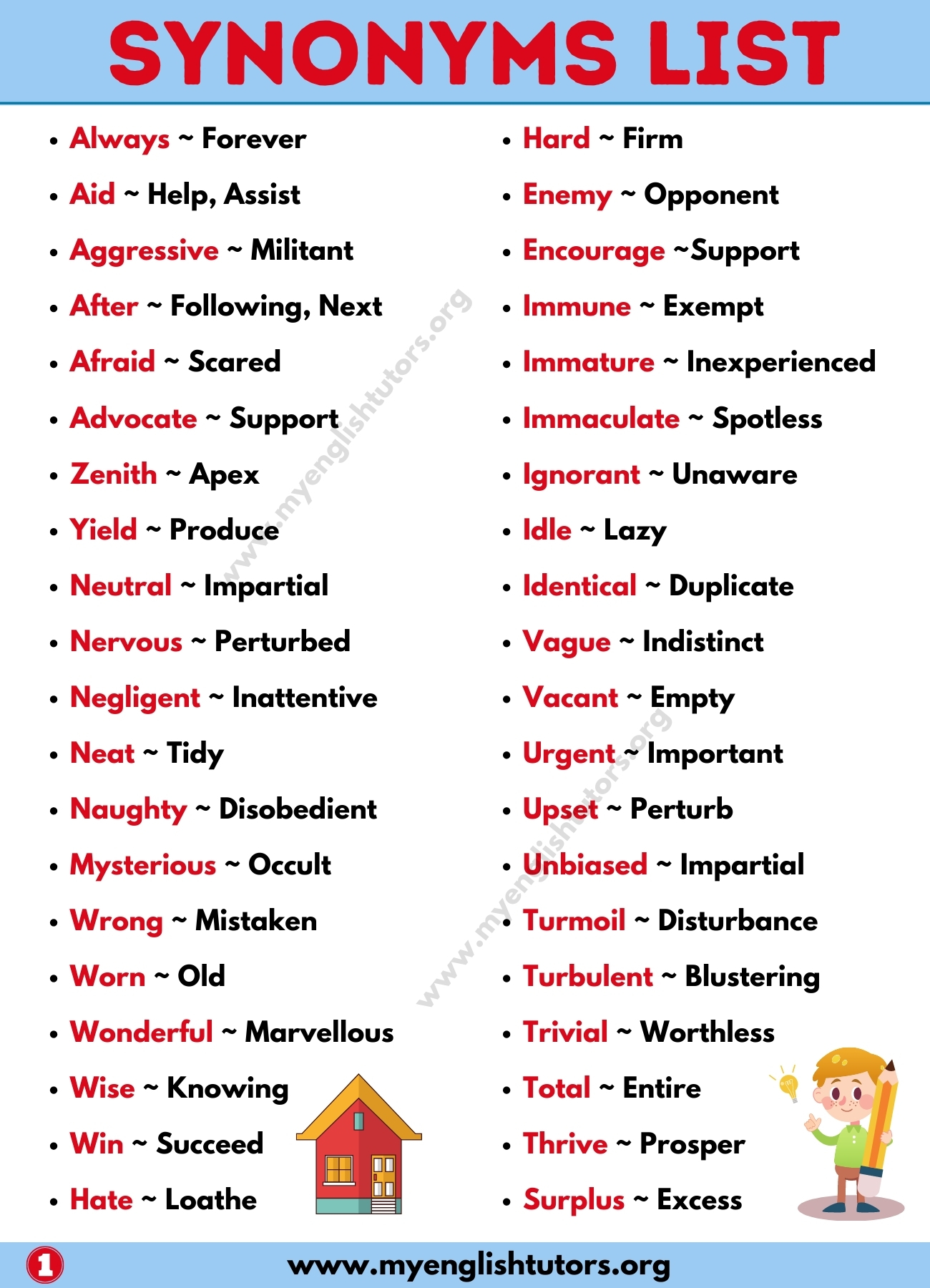
List of Synonyms Infographic 2

List of Synonyms Infographic 3
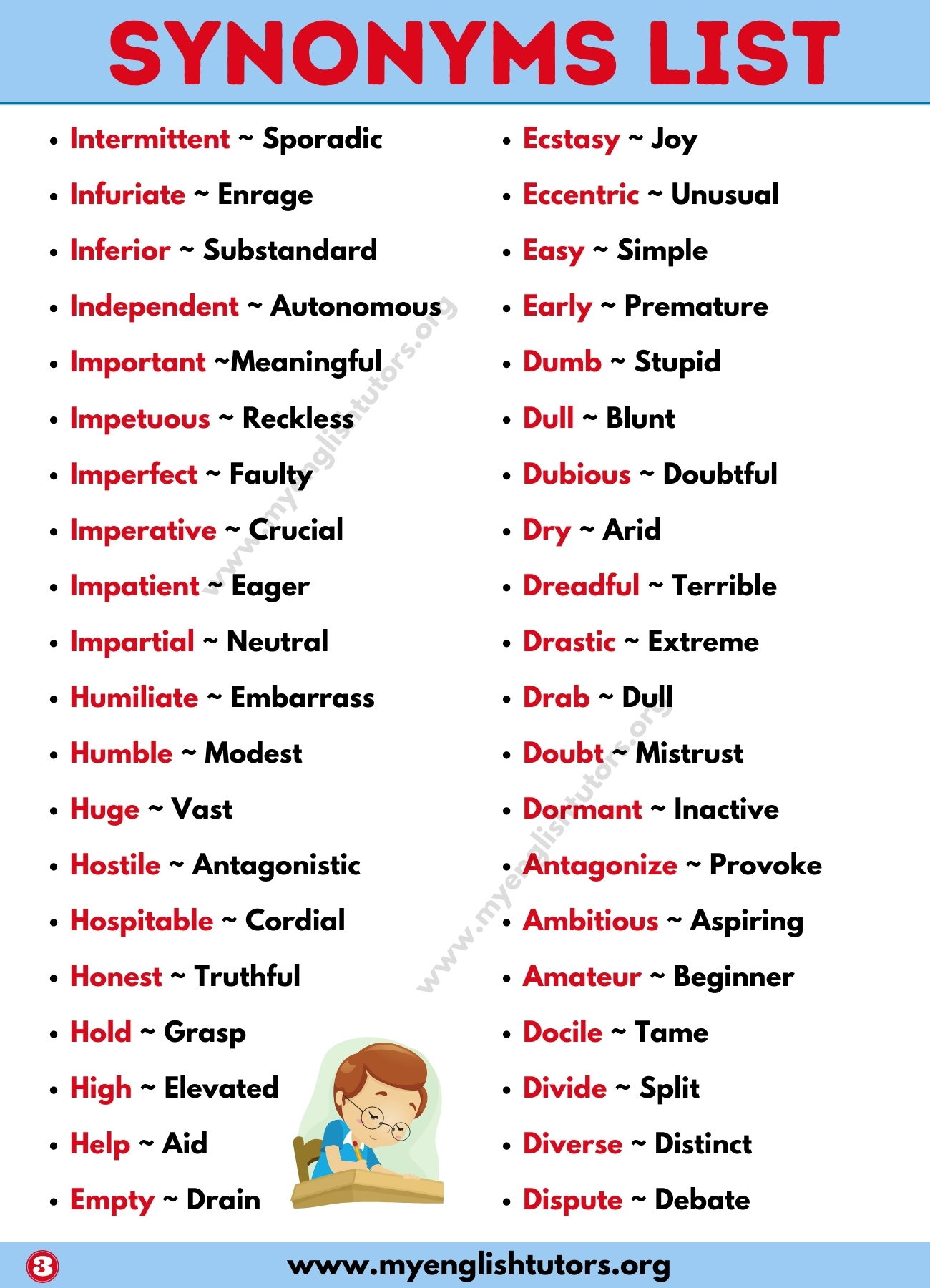
List of Synonyms Infographic 4

3.8
6
votes
Article Rating
New English words occur day by day. Some become popular, and some sink or disappear in months or years. Here we collect 100 hot new words, including meanings and sentences, to show you the alive English in today’s media and communications.
The 100 new words with sentence are not limited to 100 words. Our editors maintain the list monthly and keep it 100 words around; they add or remove words, definitions, and examples to cover the latest hot words.
Group 2: cool hunter — hangry
crema n.
a brownish foam that forms on the top of freshly made coffe
Example sentences
crowdfund v.
fund a project from lots of people who usually donate a small amount.
Example sentences
dark web n.
part of the Internet intentionally hidden from search engines with masked IP addresses, usually illegal content
Example sentences
ear tickler n.
someone who pleases other people with paying lot of compliments or flattering
Example sentences
echo chamber n.
an environment in which a person encounters only beliefs or opinions that coincide with their own, especially in social media
Example sentences
eggcorn n.
word or phrase that results from a mishearing because of similar sounds
Example sentences
emoji n.
a small digital image or icon used to express an idea, emotion
Example sentences
facepalm v.
cover one’s face with the hand as an expression of embarrassment, dismay, or exasperation
Example sentences
facerape v.
hack someone’s social-media profile in order to fiddle with its personal information or to post fake status updates
Example sentences
fast fashion n.
an approach that emphasizes making fashion clothing trends quickly and cheaply available to consumers
Example sentences
flash mob n.
brief public gathering for a common purpose, typically organized by the Internet or social media.
Example sentences
fomo n.
the fear of missing out, the anxiety that an exciting or interesting event may currently be happening elsewhere
Example sentences
freegan n.
a person who rejects consumerism and seeks to help the environment by reducing waste
Example sentences
frenemy n.
a person with whom one is friendly despite a fundamental dislike
Example sentences
frousin n.
a friend that is a cousin or a cousin that is a friend, very close relationship as family members
Example sentences
froyo n.
frozen yogurt, a slightly sour thick food made from milk, and often sugar and fruit
Example sentences
gig economy n.
a labor market characterized by short-term contracts or work as opposed to permanent jobs
Example sentences
glamping n.
outdoor camping with amenities and comforts, such as beds and electricity, not usually used when camping
Example sentences
Sequence words or linking words help us understand what’s happening in a story of a piece of text. They tell us what’s happening in the beginning, middle, or end of the story. They can also tell us that something is interrupting something else. They are also known as transition or chronological words.
Keep on reading to see more than 50 sequence words, along with example sentences.
Sequence examples English
What is a sequence word?
What are sequence words? Find out right here!
A sequence word is one that helps us understand the order of events in a story. They can tell us what happened first, next, and in the end. They are also known as linking words or connectors and are used in both speaking and writing and you see and hear them frequently when listening or reading. They are also known as transition, sequencing, or chronological words.
Sequence Words List: More than 50 with Examples
Check out these words that are used to signal the beginning, middle, and end of something.
Beginning Sequence Words
Here are some of the words which you might use to begin something.
- in the beginning
- to begin with
- to begin
- first of all
- once upon a time
- one day
- first
- firstly
- to begin with
- to start
- to start with
- once
- initially
- today
- yesterday
Examples of sentences for beginning words:
- To begin the class, introduce ourselves.
- First of all, I didn’t actually say that.
- To begin with, I’d like you to close your eyes.
- Once upon a time, there was a queen who . . .
- One day, I was riding my bike to school when . . .
- To start, you’ll have to solve the code.
Sequence with list with examples
Middle Sequence Words
- soon
- next
- meanwhile
- then
- after that
- second
- third
- fourth
- secondly
- thirdly
- fourthly
- later
- after a while
- and
- furthermore
- further
- moreover
- another
- in addition
- in addition to
- also
- subsequently
- after
- before
- later that day
- the next day
- the following day
Examples of sentences with middle words:
- Moreover, you’ll need to also clean your room before going out tonight.
- Also, I’d like to order a cake for this weekend.
- Secondly, he’s willing to work for a lower salary than that other guy.
- Meanwhile, Abby had run away.
- Another idea I have is . . .
- In addition to being handsome, he’s smart as well!
Sequence words list in English
Ending Sequence Words
- finally
- at last
- in conclusion
- to summarize
- at the end
- in the end
- afterwards
- lastly
- finally
- after all
- by the end
- by this point
- eventually
- after all of that
- to finish off
- to conclude
Examples of sentences with ending words:
- In conclusion, I’d like to open the floor to any questions you might have.
- By this point in time, I was already exhausted.
- Finally, I finished up and was able to go home.
- After all of that, I didn’t end up getting the job.
- To summarize, I’d like you all to submit your timesheets by Friday at 5 pm!
- Eventually, I’ll have to move to a place without so many stairs.
Sequence Words for Interrupting
- suddenly
- unexpectedly
- all of a sudden
- but then
Examples of sentences with interrupting words:
- Suddenly, the rain started.
- All of a sudden, the wind started to blow.
- But then, my mom changed her mind and said that I couldn’t go.
More Ideas for Learning English
If you want to improve your English ability in a big way, consider picking up this book: 1001 English Expressions and Phrases. It has hundreds of super practical idioms, phrases and expressions for a variety of situations.
Get a copy of the book today and get ready for some English awesome!
Sequence Words List: Join the Conversation
Which sequence, transition, or chronological words do you most often use? Leave a comment and let us know. We’d love to hear from you!
Last update on 2022-07-17 / Affiliate links / Images from Amazon Product Advertising API
👉 Connectors Definition

👉 CONTRAST
1. HOWEVER
- This restaurant has the best kitchen in town. However, their staff are quite rude.
2. IN CONTRAST
- House prices have gone up this year. In contrast, car prices seem to be stagnating.
3. NEVERTHELESS
- I was in so much pain I didn’t want to get up in the morning. Nevertheless, I went to football practice as usual.
4. NONETHELESS
- I don’t think Sean has serious behavioural problems. Nonetheless, I’ll talk to him first thing in the morning.
5. YET
- I’ve asked you a thousand times not to leave your dirty socks on the floor. Yet, you keep doing it.
6. ON THE OTHER HAND
- England has the best language schools. On the other hand, it has the worst weather.
7. BY COMPARISON
- Going out with Jim has its risks. By comparison, being with Tim is as easy as falling off a log.
8. ON THE CONTRARY
- I don’t hate Jim. On the contrary, I’m rather fond of him.
9. INSTEAD
- I didn’t want to take a side in the argument. Instead, I put my headphones on and listened to some smooth jazz.
10. IN ANY CASE
- I was thinking of going round Jim’s place. In any case, I haven’t been invited.
11. ALL THE SAME
- Yes, he’s very good-looking. All the same, I don’t think you should go out with him.
Read more:
Other ways to say ON THE OTHER HAND!
👉 SIMILARITY
1. LIKEWISE
- You can’t give your phone number to every man who asks for it. Likewise, you can’t go out with everyone who fancies you.
2. SIMILARLY
- You’re not allowed to use your phone here. Similarly, you have to switch it off when you’re in the library.
3. CORRESPONDINGLY
- She’s an excellent photographer. Correspondingly, her paintings are works of art.
4. IN THE SAME WAY
- Cutting down on sugar will help you lose weight. In the same way, doing more exercise will help you get rid of a few kilos.
5. ALSO
- I want to talk to Prince Harry when I’m in England. Also, I want to meet his sister-in-law.
Read more:
Difference between COMPARED TO and COMPARED WITH
👉 RESULT
1. AS A RESULT
- I’ve done a pranic healing course. As a result, I’ve been able to cure my neighbour’s sick cat.
2. AS A CONSEQUENCE
- Zack has skipped school on many occasions. As a consequence, he’s failed his French test.
3. THEREFORE
- We’re going to experience some meteor showers in the next few days. Therefore, the number of miraculous self-healings will rise.
4. THUS
- You didn’t tell me you wanted to come. Thus, we won’t be taking you with us.
5. ACCORDINGLY
- Plenty of tourists visit the area in summer. Accordingly, selling hand-made objects is the main source of income for locals.
Read more:
6 Ways to Improve Your English Writing Skills
👉 SEQUENCING
1. FIRST, FIRSTLY, FIRST OF ALL, IN THE FIRST PLACE
- First of all, I’d like to talk about the benefits of having a pet pig.
2. TO BEGIN WITH
- To begin with, pet pigs are cleaner than dogs.
3. FOR ONE THING
- For one thing, they’re completely loyal to their owners.
4. SECOND, SECONDLY, IN THE SECOND PLACE
- Secondly, their impressive numeracy skills must be mentioned.
5. FOR ANOTHER THING
- For another thing, you might want to consider how cute they look in pyjamas.
6. THIRD, THIRDLY, IN THE THIRD PLACE
- In the third place, you can always count on your pet pig to perform some tricks for you when you’d like to impress a pretty girl.
7. ALSO
- Also, they don’t eat much.
8. BESIDES
- Besides not eating much, they won’t ever chew on your electric cords.
9. IN ADDITION
- In addition, they can be taught to feed themselves if you allow them access to your pantry.
10. FURTHERMORE
- Furthermore, they make wonderful walking buddies.
11. MOREOVER
- Moreover, they’ll show you the way home when you’re drunk.
12. FINALLY
- Finally, pet pigs are fantastic guards. No burglar would ever have the heart to hurt a pet pig.
13. LAST, LASTLY, LAST OF ALL
- Lastly, your reputation as an eccentric will rapidly grow in the neighbourhood if you’re seen walking a pet pig on a leash every morning.
Read more:
18 Powerful Websites to Improve Your Writing Skills in English
👉 ORDER OF IMPORTANCE
1. MOST IMPORTANTLY
- I’d like to talk to you about how to keep calm at your workplace. Most importantly, never go to the canteen while your boss is there.
2. PRIMARILY
- You’ll have to focus on your immediate surroundings. Primarily, on your computer screen.
3. ABOVE ALL
- Above all, don’t ever look up from your notes when people are around.
4. MOST SIGNIFICANTLY
- Most significantly, avoid eye-contact at all costs.
5. ESSENTIALLY, BASICALLY (usually spoken)
- How can I put this? Essentially, having an affair with one of your colleagues should be the last thing on your mind.
Read more:
7 Special Apps To Quickly Improve Your Typing Speed
👉 PARTICULARIZATION
1. IN PARTICULAR, PARTICULARLY
- Nearly a third of marriages end in divorce. In particular, it’s middle-aged couples that yearn for much more from life.
2. MORE SPECIFICALLY
- Couples tend to argue about financial issues. More specifically, they argue when one of them is out of work.
Read more:
How Many Types of Expressions there are in English?
👉 EXAMPLIFICATION
1. FOR EXAMPLE
- To solve this problem, you might want to try making small gestures. For example, making your spouse’s favourite meal for dinner or giving him a massage after a tiring day.
2. FOR INSTANCE
- Appreciate the small things your spouse does for you. For instance, leave thank-you notes for them every now and then.
3. TO ILLUSTRATE
- Misunderstandings can be highly destructive. To illustrate, if your spouse sees you with a friend of the opposite sex in a café, he might not understand why he hasn’t been invited and demand an explanation.
Read more:
Other ways to say for example?
👉 EXPLANATION
1. THAT IS TO SAY, THAT IS
- Keep romance alive. That is to say, don’t let your lovelife fall into routine.
2. NAMELY
- I have a very good reason for not trusting my ex. Namely, he’s a convicted felon.
3. IN OTHER WORDS
- Don’t be unsociable. In other words, go out and make some friends.
4. PUT DIFFERENTLY
- John has managed to get over Jane. Put differently, he’s started seeing other women.
Read more:
10 Common English Expressions with Explanation (Video)
👉 EMPHASISING
1. AS A MATTER OF FACT
- I love sleeping with my pet pig. As a matter of fact, I can’t fall asleep unless he’s in my bed.
2. IN FACT
- I told them not to invite Rachel to the party. In fact, I was the only person who saw what a party pooper she really was.
3. ACTUALLY
- I think it would be a good idea to send her some flowers. Actually, you should get her a hundred orchids.
4. INDEED
- He may be the best-dressed man around. Indeed, he has a really good taste in fashion.
Read more:
Essential Academic Writing Examples and Phrases!
👉 FOCUSING AND LINKING
1. AS FOR (often suggests disinterest or dislike)
- I’m going to Janet’s party at the weekend. As for Mary’s, I think I’ll pass.
2. WITH RESPECT TO
- Starting your own IT company may be the one of the best things you can do right now. With respect to opening a pet shop, it’s hard to say the same thing.
3. REGARDING
- Start your day with making the most important phone calls. Regarding emails, you might put them off until later.
4. WITH REGARD TO
- With regard to handling complaints, you might want to keep in mind that your customers are always right.
5. AS REGARDS
- Working from home has many advantages. As regards disadvantages, it might be difficult to keep your cat off your keyboard.
6. TALKING OF
- Talking of cats, you can’t trust them to keep you company when you need it. They’re quite selfish creatures.
7. AS FAR AS … CONCERNED
- As far as dogs are concerned, they might give you a chance to get up from your desk and get some exercise during the day.
Read more:
English Grammar: Sentence Structure in English
👉 CONCLUSION
1. IN CONCLUSION
- In conclusion, it may be said that pigs make the best pets.
2. IN BRIEF
- Meeting my boss at the pub was an interesting experience. In brief, it was a disaster.
3. IN SUMMARY
- In summary, it may not be the best idea to frequent the same pubs as your boss.
4. TO SUM UP
- To sum up, some people are better suited to working from home than others.
5. ALL IN ALL
- All in all, you have to make sure both you and your customers are satisfied with your work.
Read more:
What are the other ways to say in conclusion?
👉 CORRECTION
1. RATHER
- I thought it was a good idea to get a ferret. Rather, it had always been my dream to get one.
2. TO BE MORE PRECISE
- You might want to change a few things. To be more precise, I think you should start again from scratch.
Read more:
Best English Grammar and Spelling Checkers Online
👉 TIME
1. AT FIRST
- It wasn’t a piece of cake to learn English. At first, I couldn’t pronounce all the words correctly.
2. THEN
- Then, I couldn’t spell all the words correctly.
3. AFTERWARDS
- Afterwards, I had a hard time understanding the tenses.
4. LATER
- Later, I couldn’t memorize phrasal verbs and idioms.
5. IN THE MEANTIME
- In the meantime, I was getting some help from MyEnglishTeacher.
6. MEANWHILE
- Meanwhile, I was enjoying my skype lessons more and more.
Read more:
A Visual List of 100 English IDIOMS FOR TIME with Examples
👉 DISMISSAL
(of what was said before)
1. ANYWAY
- I couldn’t get my head around the Passive Voice. Anyway, I don’t think it’s important to use it all the time.
2. ANYHOW
- Anyhow, I’ve just decided to learn Russian next.
3. AT ANY RATE
- At any rate, I don’t want to become a simultaneous interpreter in five languages.
Linking Words Quiz › TEST YOURSELF
- ________________, we have to address the main issue. It’s important that we all recognize our own fault in the matter.
- So
- To begin with
- Also
- Now
- All the ballots have been accounted for. ____________, we’ve also double-checked the amount and cross-referenced the names.
- Then
- In short
- Thus
- Accordingly
- _____________ Lisa is _____________, Miranda can take over the research and development department.
- As far as / concerned
- However / asked
- As far as / thinking
- As for / treated
- This argument is not clearly formulated in your thesis. ______________, it remains unclear what your overarching goal is.
- However
- Besides
- Furthermore
- But
- You remember Sam from school? I met him just before work. ___________, we’re going to go get a drink.
- Subsequently
- Tomorrow
- Now
- Afterwards
- The doctor will be with you shortly. ______________, help yourself to some of our magazines, and there’s an activity corner for the children.
- Finally
- Later
- Meanwhile
- At last
- This is not a viable option for many reasons. _____________, we simply don’t have the budget.
- That is
- In short
- After all
- Despite this
- I would like to order a pizza. _____________, can I have a coke with that please.
- But
- Also
- Next
- Similarly
- If we expand operations in these highlighted sectors we’ll double our earnings. ____________, the company will be able to expand to other cities.
- Then
- Afterwards
- As a result
- Thus
- The bills have gone up this month considerably. __________________, I think we’ll be canceling some of the subscriptions we have.
- At any rate
- As for
- All in all
- Actually
- According to this theory, the main character can also function as the antagonist. ______________, their role is perfect for the role of antagonist in this situation.
- Nevertheless
- Indeed
- Despite this
- In fact
- His mom told him so many times not to play on ice. __________, he didn’t listen until he slipped.
- Yet
- In contrast
- And
- Instead
- If you can’t find parking here we should head into the city center. There’s a parking garage _________________ of the theater.
- Inside
- Outside
- On the other side
- Beyond
- We’re not going to get a table at the Italian place this late. ____________, we can go to the Greek place just down the street.
- Instead
- Yet
- Maybe
- All the same
- During this drill you’ll need to focus on your target. ______________, I want you to engage the enemy and secure the hostages.
- Primarily
- But
- Also
- Secondary
- _______________, I’d like to thank everyone for being here on this rainy day. ______________, I’d like to thank our sponsors for making all this possible.
- Soon / After
- Now / Later
- Firstly / Secondly
- Before / After
- You need to go down the street for three blocks, and then make a right turn at the intersection. _____________ you’ll find the Chinese restaurant you’re looking for.
- In the back
- Nearby
- There
- Now
- Bring the presents down to the car, ____________ don’t forget the flower for mom.
- And
- So
- Too
- But
- I did feel something for Jason before we broke up. _______________, he did lie to me often.
- Instead
- On the other hand
- But
- All the same
- The fundraiser was a tremendous success because there were over a hundred people attending. _____________, we made thousands of dollars in donations.
- Subsequently
- Also
- Conversely
- On top of that
- We’ve been working on this presentation for weeks now and Mark hasn’t contributed anything. _______________, I believe he hasn’t even read the materials.
- However
- Regarding
- Namely
- In fact
- Mom said your friends can’t be in the study, since all of dad’s stuff is there. ______________, she doesn’t want you near his rifle collection.
- Ever
- Currently
- In particular
- Moreover
- We’re going to have to change your graphics card. ________________, the motherboard is incompatible with the one you currently have.
- Along those lines
- Namely
- Yet
- In other words
- He never listens to me! ________________, we have to talk about the new fiscal year.
- So
- Because
- Instead
- Nevertheless
- I’m going to go out with Jake, since he’s asked me so many times. _______________, what have I got to lose.
- Again
- Besides
- Despite
- Similarly
- I know you really liked him, but he’s a jerk. _______________, you’re better off without him.
- For one thing
- Finally
- Besides
- Lastly
- _______________ you don’t shift gears from 1st to 3rd, ____________ you can’t shift from 1st into reverse.
- Another / like
- Now / then
- Just as / so too
- Likewise / equally
- This housing project will bring so many jobs to the local community. _______________, the quality of life will also improve.
- Therefore
- However
- Despite
- Yet
- People say English is so easy to learn. _________________, most of them are not aware of the all the grammatical complexities.
- Nevertheless
- And
- But
- On the other hand
- This item is something we offer. ____________, we don’t have it in stock.
- Finally
- Here
- Meanwhile
- Currently
👉 Connectors Synonyms
Connectors are not only used in grammar. Connectors are things that are used to connect or tether two, or more, things together. There are many different synonyms for connectors:
Examples:
- Bond, coupling, joint, link, adapter, clamp, fastener, junction, tie, terminal, plug, fitting, splicing, fastener, sleeve, etc.
👉 Sentence Definition
A sentence is a set of words that forms a coherent and complete thought and message. This means that a sentence says something concrete. It has to be structured and logical in order for the sentence to be correct.
Sentences are made up of various parts, such as: nouns, verbs, adjectives, pronouns, articles, etc. Within a sentence, there are parts that relate the thought and message, such as: subject, predicate, object, phrase, punctuation, etc. Each of these parts is important for a sentence to be complete.
Through sentences we tell other people what we think, feel, or what we want to do. In order to relate those thoughts we string together words into groups. These finally relate our message to other people and the world.
There are four different types of sentences, and each has its own specific goal and structure. These types are: declarative, imperative, interrogative, and exclamatory.

 Indignity- (noun)
Indignity- (noun)

